blog
What steps should I take to become a full time writer? I’m graduating uni soon & plan to take a year off to write and then I’ll get qualified in teaching the year after but I really hope I can earn a living through my writing. The future scares me :(
 Apr 01, 2015
Apr 01, 2015
This is a tough question because no two writers follow the same path to publication or to full-time writer-dom. And there are so many sub-categories to this answer, so I’m just going to give the broad strokes here. Feel free to follow up with specifics if I don’t address your question! Warning: this is also really long. I apologize in advance. But it’s a BIG question. More under the cut, to spare people just scrolling past from getting a huge block of text. 😉
READ ON FOR ADVICE ON BECOMING A FULL TIME WRITER…
The first thing you should know is that very few writers (statistically speaking) support themselves entirely on their writing work as full-time writers. Many very successful authors I know have other jobs and/or spouses to support the writing career, especially because being a self-employed artist comes with zero benefits of the financial kind.
Someone out there is going to disagree with me, I’m sure, but I strongly believe that you should never, ever become an artist of any kind for the money. For one thing, it’s way too easy to be disappointed if you never make it big, and for that disappointment to taint your love of creating art. I always tell people to ask themselves this question: If I never get paid a dime for my work, and I knew RIGHT NOW that I’d never get paid a dime for it, would I still do it? It’s okay for the answer to that question to be no! But it’s something worth knowing about yourself and your work, so that you can continue to reevaluate your goals as you move forward.
Now, I’m NOT telling all this to scare you. Far from it. I love being a writer, and I wouldn’t exchange it for any other job in the world. I’m also not trying to discourage you. But others WILL try to discourage you (every single writer out there can tell you about some naysayer who told him or her to study accounting instead) so I’m just laying out the realities so you’ll be prepared when others throw them at you.
SO. First of all, be prepared to work another job while you write (which it sounds like you are: teaching!). You may have to spend many years cramming your writing into lunch breaks and late night or early morning sessions. This can, strangely, help productivity. If you know you’ve only got an hour to write before you’ve got to go back to your job, you’ll end up writing like the wind.
Secondly, if you can afford to take a year to write before starting at another job, that’s fantastic. SEIZE THAT OPPORTUNITY, because it’s invaluable. Make the most of it. Just don’t bank on having a steady writing income by the time the year’s up. While it might happen, there’s no guarantee, so be prepared for what you’ll do if you’re not published by then.
Some advice on what to do to prepare for being a professional writer:
- Read a lot. And not just for entertainment, though I’m a firm believer that life is short, so read what you want. 😉 But read critically. If you read something you really love, go back and try to figure out how the author did what he or she did. What about this character made you fall in love? What about that plot twist made it so satisfying?
- Write a lot. A lot of people disparage the idea of writing every day. I used to be one of them. I also never finished a novel until I tried it, and that experience made me a convert. But whatever it is, come up with a system for making yourself write regularly. The point is to start making the conversion in your head from “hobby” to “job.” This doesn’t mean it has to stop being fun, though your relationship with writing may change, which is okay.
- Share your work. Find someone to read your work critically. There are a lot of great blog posts out there about how to find a critique partner, so I won’t go into it here. But getting used to both sharing your work and receiving both positive and negative feedback on it is invaluable. It gets easier the more you do it. It never gets EASY (at least it hasn’t for me!) but it gets easier.
- Study the business. Follow writers on social media. Follow their agents. Follow their publishers. Read articles about how to get published, and read them from a variety of sources, because there are differing opinions that are all still valid. Read Publisher’s Marketplace and get a feel for what sort of books are selling right now, and how they’re pitched. When I began writing my first full novel (which ended up being Skylark) I started studying how one gets published, entirely via the internet. It helped motivate me to keep going, and by the time I’d finished writing the novel, I knew my plan of action when it came to querying agents.
- And yes. Get an agent. Some writers do work without them, but personally, I am so grateful for mine and absolutely believe it’s worth the 15% commission. Not only do I think I would’ve struggled to get published at all without one, I KNOW I wouldn’t be making enough money to be full-time. All that aside, agents handle so much of the day-to-day junk that comes with writing—dealing with your publisher, fighting your fights for you, keeping track of income for tax purposes, selling to foreign publishers you’ve never even heard of, and a million other things. If you want to be traditionally published (as opposed to self-published) get an agent.
- Set goals you can control. Don’t fall into the trap of “If I can just ________, I’ll be happy.” Because that bar keeps moving. You might think that getting an agent will make you happy, but then once you get one, you realize that now you’ve got to go on submission to publishers. Then it might be just selling your book that’ll make you happy, but then you have to see how it actually does in the market. Getting fans and followers. Selling another book. Getting to go on tour. Getting good critical reviews. Hitting various bestseller lists. Selling movie rights. These are all things over which you have next to no control, and if you make these things your goals, you’re going to be disappointed sooner or later. They can be dreams (because you should never stop dreaming) but don’t make them goals you HAVE to achieve to find satisfaction in your work. Set long term goals like “I’m going to finish my novel this year” and short term goals like “each week I’m going to research one new agent.” The rest will happen, or not happen, by itself.
The future IS scary. Trust me, it doesn’t stop being scary as far as I know. And if you’re looking for security, a career as a writer is not likely to provide a fear-free life. But in my experience, facing that fear gets easier with time. The first few years after publication are fraught with ups and downs as the reality of the business sets in. I’m still afraid, all the time, that my own career is a soap bubble dream that’ll burst if I look at it too hard. But fear doesn’t have to be a bad thing. I choose consciously to make that fear a positive, because it motivates me. (Sometimes I’m better at this conscious choice than other times.) I work hard because I love my work and don’t ever want it taken away from me, because what on earth else would I do for a living? I use my fear to drive me.
So it’s okay to be scared. It’s okay to acknowledge that you’re scared. Just don’t let your fear immobilize you. Bravery is going ahead despite being afraid, and art, ANY kind of art, is bravery. Every single one of us was scared too. You’re going to pour your heart onto a page and then ask someone you’ve never met to love it. It’s scary. But you can do it.
You can do it.
 Anonymous, ask, author life, blog, full-time writer, publishing industry, writing advice, writing tips
Anonymous, ask, author life, blog, full-time writer, publishing industry, writing advice, writing tips
If you’ve ever wanted to study writing craft but…
 Dec 02, 2014
Dec 02, 2014
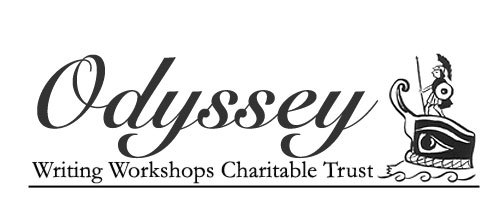
If you’ve ever wanted to study writing craft but don’t have the time or resources for an MFA or a full-time workshop, this is for you. The Odyssey Writing Workshop offers online courses, and this is the last week to register for the next session! The courses offered this time are “Showing vs. Telling,” “Crafting Compelling Scenes,” and “Effective Endings.”
I attended the full 6-week Odyssey workshop in 2009 and it was one of the best things I ever did for my writing career. Learning to do consciously what I’d previously done on instinct meant a wooooorld of difference when it came to writing and revising my work, and getting it publication-ready.
So check it out, and be sure to pass this along to any other aspiring writers out there who might be interested! Here’s where you can learn more about it.
Thanks to all of you who voted, These Broken Stars has made it…
 Nov 11, 2014
Nov 11, 2014
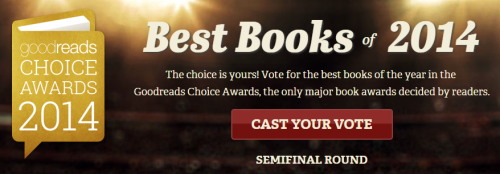
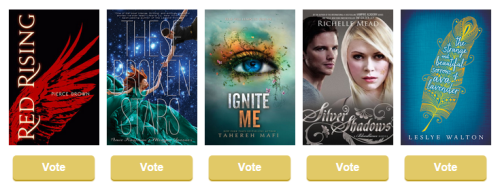
Thanks to all of you who voted, These Broken Stars has made it through to the semifinal round of the Goodreads Choice Awards! We’re so floored to have made it this far along with the other truly fantastic books up there. Most of our competition are bestsellers and second or third books in super popular series, which to us just proves that we have the BEST fans and readers authors could ask for!

If you voted for it the first time around, make sure you go vote again to see it through to the finals! Tell your family, tell your followers, tell your friends, tell your fish if your fish can navigate a web browser.
And if this is the first you’re hearing of it, then what are you waiting for? Go vote!
If you’re just hearing about my international Reader…
 Jul 17, 2014
Jul 17, 2014


If you’re just hearing about my international Reader Appreciation Giveaway for the first time, don’t worry! It’s not even halfway over yet. We’ve had two our of the four weekly drawings, whose winners have chosen a signed copy of Skylark and a signed copy of Lark Ascending, and the grand prize (a package of ALL the above books, including the advance reader copy of This Shattered World) is still open. Winners for that will be drawn at the very end of the month.
Remember that while newsletter subscriptions still count for the most entry points, you can reblog the original post and the tweet linked there up to once a day, and each signal-boost increases your odds. Both winners so far were newsletter subscribers that were also signal-boosting!
A Reluctant Star, Sia Deals With Fame On Her Own Terms
 Jul 09, 2014
Jul 09, 2014
A Reluctant Star, Sia Deals With Fame On Her Own Terms:
Sia says a lot of pop songs follow certain formulas, contain certain universal themes. There’s “victim to victory.”
“The ‘victim to victory’ theory,” she says, “is that, if you listen to the radio, a large percentage of the hits are … about victim to victory, like ‘I’m having a terrible time.’ And then the pre-chrous is ‘I don’t know what’s gonna happen next.’ And the chorus is, ‘Now I’m brilliant, and everything is great, because something happened to make it great.’”
This is fascinating—because not only is it true of pop songs, I find it tends to be true of a lot of YA hits as well. You start out with the protagonist in a victim situation and over the course of the book they are forged and molded by the crucible of the plot and their choices into something stronger, more fiery, incandescent.
It’s certainly not true of all YA, but I think it says something about the kind of story that appeals to young women right now. The idea of emerging from victimhood—whether physical, emotional, societal—into strength and independence is so compelling that it takes over even our fantasies, even our art and music.
The newsletter I share with amiekaufman went out this morning….
 Jul 07, 2014
Jul 07, 2014
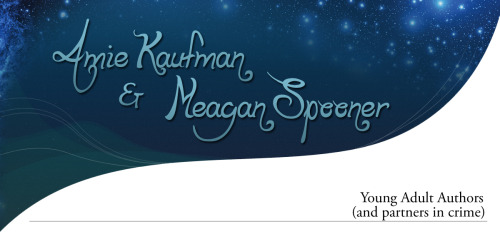
The newsletter I share with amiekaufman went out this morning. Over the months we’ve had numerous reports of subscribers only occasionally receiving the newsletter, and this month I’m going to do my best to troubleshoot that. To do so, I need YOUR help!
So if you were subscribed as of 11am EST today, July 7, but you didn’t get this morning’s newsletter, the first thing to do is search your spam folder. If you find our email in your spam folder, try adding us (starboundtrilogy [at] gmail [dot] com) to your contacts or address book so that your email client knows we’re a safe sender.
If you didn’t get the newsletter AND you can’t find it in your spam/junk folder, and if you’re willing to help me troubleshoot this issue with Mailchimp, please email me at the starboundtrilogy address above. Thanks, guys!
No apologies for writing sad things.
 Apr 15, 2014
Apr 15, 2014
So this is a question I got several days ago from a nice reader from France who thanked me for making her cry. (This is the best kind of email.) Then she went on to ask this:
Sometimes do you feel bad when you give sorrow to your readers?
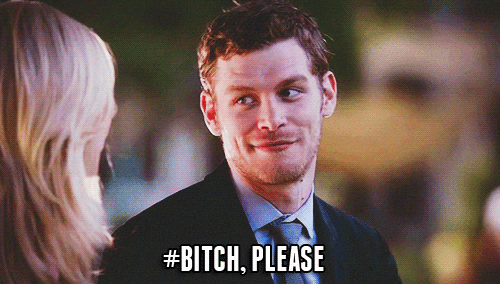
I was going to toss off a quick “No! MUAHAHAHA!” in response, but it was late and I was tired and I went to bed instead. And then I woke up the next morning thinking about the question. Because it’s one I’ve gotten before, and one I’ve seen other authors get all the time, but I’ve never examined much beyond “Nope, it’s all good.”
So here’s the deal. No, I don’t feel sorry for my readers when I write a sad thing. If only good, predictable things happened in stories, they’d be pretty boring. To me, fiction is a way to rehearse life from the safety of your own room. You can experience tragedy and terror and triumph, all the while able to close the book and walk away from the emotions any time they get too difficult. It’s the wonderful thing about fiction—it’s why books never get old. We humans have a lot of feels. They take a lot of rehearsing.

But I do feel for my readers. Yes, I end up a bit gleeful whenever a reader reports feeling what I wanted them to feel, even if it’s sadness or fear, because that means I’m doing my job. But I also get this pang of sympathetic emotion, too, as if I can feel exactly what they’re feeling—usually because I HAVE, while I was writing whatever the sad thing was.
To me, it’s one of the best parts about being a writer. That sense of connection, of being able to share something as intangible and indescribable as an emotion directly from your heart to a stranger’s halfway around the world.
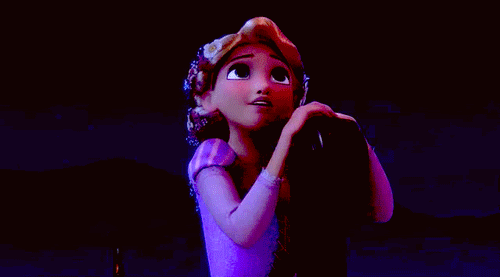
Because it doesn’t always happen—not every reader loves every book, after all. But when it does, it’s like finding a friend, someone whose mind works like yours and feels the same things. My memories of beloved books rarely involve specific events in the plot or lines of dialogue. They’re almost always memories of emotion, of how the book made me feel, and how they made me feel connected to the person who wrote it.
So do I feel bad for giving sorrow to my readers? Not really… because my fondest memories of fiction are of authors giving sorrow—and joy, and fear, and love, and wonder—to me. That experience, that connection, was what made me want to be a writer too. And this experience is what makes me want to stay a writer.
Aurealis Award winners announced!
 Apr 05, 2014
Apr 05, 2014
Aurealis Award winners announced!:
BEST YOUNG ADULT NOVEL
The Big Dry by Tony Davies (Harper Collins)
Hunting by Andrea Host (self-published)
These Broken Stars by Amie Kaufman and Meagan Spooner (Allen & Unwin)
Fairytales for Wilde Girls by Allyse Near (Random House Australia)
The Sky So Heavy by Claire Zorn (University of Queensland Press)
I woke up this morning to find the news in my inbox and absolutely thought Amie was messing with me. It’s taken a few hours of refreshing things and looking at recaps but I’m pretty sure this is actually real.
We are 100% blown away—did not expect it in a million years! But we’re so honored and so excited to be listed among all these amazingly talented authors. Thank you so much to the judges, and congratulations to all the winners!
I’m harder on female characters than I am on male characters.
 Dec 27, 2013
Dec 27, 2013
I’m harder on female characters than I am on male characters.:
I came to this realization while reading “These Broken Stars.” If you haven’t read my review of the book, know this…I LOVED IT, but not at first. When the characters first crash landed on the planet where the story unfolds, I must admit that I was annoyed. With Lilac.
Lilac was born of…
This is pretty cool… one reader’s reaction to THESE BROKEN STARS was to realize that she’s a lot quicker to judge female characters for showing weakness than male characters, and come to love a character she’d originally hated.
It’s funny, because I had to constantly resist the urge to make Lilac more competent, to give her secret (and wildly out of character) survival skills so that she wouldn’t be useless in the beginning, to make her totally wow Tarver with her awesome specialness. Amie (who, by the way, never once lost faith in Lilac) can vouch for the fact that I’d occasionally go “I can’t do this, I have to give her a crossbow!”
I loved Lilac, and wanted readers to love her too… and that’s the easiest, cheatiest way to make a reader like a character. It’s Fiction-Writing 101. Make the character good at something, and readers will like him or her. But creating a potentially unlikable character who transforms into someone likable… that’s what I wanted to do.
I knew that many (if not most) readers would judge her for her failings in the first 1/3 of the book. I knew that there were going to be plenty of people who’d make their decision about her character and stick to it to the end. And that was a really tough choice, believe me, and one I may not have stuck to without the support of early readers. (I’m not nearly brave enough by myself.)
Willingly sacrificing some readers in order to provide others the arc you find more compelling is… rough. It involves committing to a level of trust in your readers that takes its toll on your confidence, especially when you can see an easier way out.
But that’s actually what has kind of amazed me since THESE BROKEN STARS came out. Yes, you see people saying things like “OMG I just want to SLAP Lilac!” in that first third. And, of course, there are people out there, I’m sure, who hate her, hate the book, etc. There always are. But I’ve been hearing from more and more readers about how much she grew on them and how much she came to represent for them. In a way I value these transformations of reader opinion even more than the people who say they liked her from the start (though obviously, that makes me glee too!)
As an author there’s absolutely no feeling like doing something that was really, really hard for you to do… and then having readers get it. It’s like a mind-meld. For a few hundred pages, those readers and the author, no matter how much time and distance separate them, are thinking the same thoughts and experiencing the same things.
Which is its own kind of magic.
On Luck
 Dec 18, 2013
Dec 18, 2013
So I’m going to talk to you guys about luck.
In this profession, as published authors, as women, we’re encouraged to smile modestly and duck our heads and say “Well, I got very lucky." I admit, I have done this many times when someone praised my work. I’m uncomfortable with praise like that, and my entire first year as an author was spent learning to just say "thank you.” But every time the words “I don’t know, just lucky, I guess” escaped my lips, I felt a little bit worse about myself, about my achievements. Citing luck made me begin to think it really was luck, and had nothing to do with the fact that I decided to be an author at four years old and have been working toward it ever since.
Because that’s the most insidious part of this particular societal expectation: we actually train ourselves to believe that we just got lucky.
As authors, but particularly as female authors, we’re expected to diminish our accomplishments and attribute our success to fate or luck. Just the right manuscript hitting the market at the right time, through an absolutely random series of events. It’s considered bragging or self-aggrandizement to admit to having worked your ass off for years to get where you are.
Society prefers to view women as passive and receptive, not as ambitious people in their own right who have goals and set out to reach them. Girls should be modest and self-effacing. Masters of self-abnegation. Minimizing our accomplishments makes us seem more feminine, more demure. Sweeter. Prettier. Gentler.
Ambition is a masculine trait. Achievement is aggressive. Success, on a woman, isn’t sexy.
This is bullshit.
Why is it arrogant to say that you overcame obstacles? Why is it bragging to admit that the reason you’re published and someone else isn’t is because you didn’t give up? Why does it make us less woman to tell the truth about how we got to where we are? Why do we cheapen ourselves for the sake of appearances?
Because saying “I was lucky” cheapens the work you’ve done, and it cheapens the work of other authors. You can’t claim your success was due to luck without implying theirs was, too. Citing luck cheapens the drive in your heart, that voice that continually tells you to do better, to be better. It cheapens the part of your soul that pushes you on to greater things.
Most of all, it cheapens the aspirations of those to follow you. Tell an aspiring writer that you got lucky, and they’re going to spend their days hoping that a blue fairy will come down out of the sky one night and whisk them away to fame and fortune. They’ll be waiting forever.
Tell them you worked hard. Tell them it was awful, a lot of the time, and that most days you felt like you’d never get there. But tell them that you kept slogging through because you knew this was what you wanted. Tell them that you were ambitious, and that you still are, and that this drive is what makes you better. Tell them you fought for what you have.
Don’t just smile coyly and say, “Lucky, I guess.” Let young girls see us taking credit for our hard work. Let them realize that it’s not only okay to work hard, it’s okay to talk about it. Let them see us being ambitious and pushing ourselves to be better all the time. Let them grow up watching women who aren’t afraid to say “Yes, I did that. That was me.”